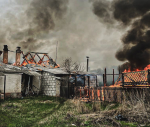You are here
The gospel according to Q
Aug 01,2021 - Last updated at Aug 01,2021
MARYLAND EASTERN SHORE — “Power tends to corrupt, and absolute power corrupts absolutely,” Lord Acton wrote in a letter to an Anglican bishop in 1887. Acton was considering how religious historians should handle past crimes committed by the church’s leaders. In his view, religious (and political) leaders should be held to a higher moral standard than ordinary people. When historical accounts fail to do that, they “serve the worst better than the purest”.
Future historians should bear Acton’s guidance in mind when assessing America’s religious right and its current leaders.
I know from my experience in the Soviet Union that clerics should not be exempt from moral judgment. Aleksey II, patriarch of the Orthodox Church during my youth, was long suspected of KGB membership and happily worked hand in glove with the Soviet and then Russian state. Today, Alexey’s successor, Patriarch Kirill, has not hesitated to do the bidding of a former KGB operative, President Vladimir Putin, whether justifying Crimea’s annexation or stoking fear and loathing of homosexuals.
America, of course, keeps religion and politics constitutionally separate. But for many conservative Christians in the United States today, the First Amendment’s prohibition of any “law respecting an establishment of religion” means little. Moreover, what they hope to set up in US law is not the moral code established in the Christian Bible. According to the historian Kristin Kobes Du Mez, modern white evangelicals have remade their faith over the last 75 years, replacing the loving Jesus of the Gospels with an “idol of rugged masculinity and Christian nationalism”.
Nowadays, these evangelicals want a “ruggedly masculine” leader who will fight to outlaw abortion. That goal has also put blinders on much of the hierarchy of the US Catholic Church. In recent months, a large group of Catholic bishops has sought to introduce new rules that would deny Holy Communion to politicians who support abortion rights, deliberately disobeying Pope Francis in the process. Their target is President Joe Biden, America’s first Catholic president since John F. Kennedy and a regular churchgoer.
Meanwhile, America’s religious right exalts Biden’s predecessor, Donald Trump, because, though louche and tawdry, he opposes abortion (at least publicly), and embraces a macho persona. In an open letter ahead of the 2020 presidential election, Archbishop Carlo Maria Viganò, a former Vatican ambassador to the US, described Trump (“who courageously defends the right to life”) as America’s only hope against an “infernal deception”. Viganò proceeds to describe a “Biblical” contest between the “children of light” — led, absurdly, by the mendacious, libertine Trump — and the “children of darkness”, whom we “may easily identify with the deep state”.
This hardly sounds like a senior Church official. Viganò calls the COVID-19 crisis a “colossal operation of social engineering”, in which “there are people who have decided the fate of humanity, arrogating to themselves the right to act against the will of citizens and their representatives in the governments of nations.” This is textbook QAnon. Evil is now supposedly so rampant that David Fulton, a Catholic priest from Nebraska, boasted of performing an exorcism during the US Capitol riot on January 6 in order to drive out a demon named Baphomet who was “dissolving the country”.
The QAnon cult is founded on the myth that a cabal of Satan-worshipping liberal elite pedophiles are running a global child sex-trafficking operation and using their prominent positions in government, the media, and finance to try to impose global government. Trump, QAnon followers believe, is leading a righteous battle against this cabal, which has worked relentlessly to take him down.
White evangelicals have been particularly susceptible to this story. In a March poll, the Public Religion Research Institute and the Interfaith Youth Core indicated that 15 per cent of Americans believed the QAnon gospel of Manichean struggle. According to a January study by the American Enterprise Institute, that share was nearly double among white evangelicals.
The failure of the QAnon prophecy that Trump would triumphantly return to the White House on March 4 has apparently done little to discredit the cult. Perhaps this shouldn’t surprise us: This kind of blind faith is exactly what evangelists encourage. And, indeed, religious leaders have often been the ones spreading QAnon conspiracy theories.
In fact, there is nothing new about those ideas. QAnon is merely repackaging the contents of “The Protocols of the Learned Elders of Zion”, a pamphlet that appeared in 1903 and purported to comprise the confidential minutes of a meeting of powerful Jews plotting to take over the world. All of the classic anti-Semitic tropes are there: Jews kidnap and slaughter children, then consume their blood to gain special powers. They control high positions in government, the financial sector and the media. They promote pedophilia. And they want to weaken the white race through miscegenation.
The Russian Okhrana (the Czarist secret police) probably never expected anti-Semites around the world to embrace their creation, even as it was repeatedly and unequivocally debunked. And they almost certainly would not have guessed that the Protocols would help to fuel the Holocaust. But the pamphlet played an integral role in Nazi propaganda, and its underlying myth shaped the thinking of Hitler and Goebbels.
Likewise, the originators of the QAnon conspiracy might not have intended it to become a unifying religion for violent Trump supporters. And while some QAnon-linked politicians are undoubtedly devotees — US Representative Marjorie Taylor Greene, who asserted that California’s 2018 wildfires were caused by “a Jewish space laser”, is a case in point — others probably see a pool of potential voters.
But the attempted insurrection at the US Capitol on January 6 revealed QAnon’s deadly potential. The event looked much like the birth of a religious sect, rooted in white evangelism, supported by reactionary Catholics, and determined to steer the pious toward a political Apocalypse.
Still, Lord Acton can rest easy. Future historians are unlikely to spare the instigators of what Joan Didion once called “the thin whine of hysteria” that can now be heard across America.
Nina L. Khrushcheva, professor of International Affairs at The New School, is the co-author (with Jeffrey Tayler), most recently, of “In Putin’s Footsteps: Searching for the Soul of an Empire Across Russia’s Eleven Time Zones”. Copyright: Project Syndicate, 2021.












